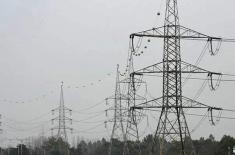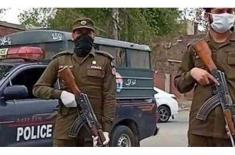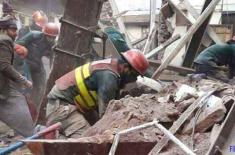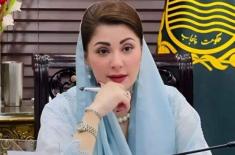
Modi’s Odhampur Speech Reflects Tone Of Defeated Premier: Experts
Faizan Hashmi Published May 14, 2025 | 10:38 PM

Indian Prime Minister Narendra Modi’s speech at Odhampur has been widely interpreted as a reflection of a defeated leader's rhetoric, who tried to hide his forces' failure through hollow emotional statements
PESHAWAR, (UrduPoint / Pakistan Point News - 14th May, 2025) Indian Prime Minister Narendra Modi’s speech at Odhampur has been widely interpreted as a reflection of a defeated leader's rhetoric, who tried to hide his forces' failure through hollow emotional statements.
“Modi merely repeated a discredited narrative of aggression after facing a decisive military setback at the hands of Pakistan’s armed forces during operation Iron Wall,” said Abdul Basit, former High Commissioner of Pakistan while talking to APP.
He argued that the Indian Prime Minister’s attempt to raise the morale of his military failed to resonate, particularly after Pakistan’s successful execution of Operation Iron Wall that jolted India on May 10.
He stated that India’s much-touted military acquisitions, such as the Rafale jets, proved ineffective against Pakistan’s integrated defense strategy.
“India’s high-profile defense posturing has been badly exposed. The Iron Wall operation conducted by Pakistan not only countered a coordinated and technologically advanced Indian offensive but also redefined regional military doctrines and Pakistan superiority in modern warfare,” he said.
Pakistan’s air force secured six confirmed kills—including three Rafael jets—without losing a single aircraft, showcasing superior operational planning, real-time intelligence integration, and electromagnetic warfare capabilities.
“Pakistan moved swiftly from a defensive posture to assertive control in just two days,” he said, calling it one of the most sophisticated aerial engagements of the 21st century.
He said that even civil society and politicians of opposition parties at India were raising fingers to Modi Govt after his failed Sindoor operation.
On the diplomatic front, he said the aftermath reshaped global perceptions and India’s longstanding narrative as a regional stabilizer and net security provider in the Indo-Pacific faltered amid widespread neutrality from Western allies.
In contrast, Pakistan secured quiet but substantial diplomatic backing from China, Türkiye, Gulf countries, and Saudi Arabia.
Abdul Basit said the time had come to find a solution of the Kashmir dispute and the UN Security Council resolutions were best option for it.
Professor Dr. Ejaz Khan, former Chairman of the International Relations Department at the University of Peshawar, noted the visible unease in Modi’s Adampur address, suggesting that it stemmed from the destruction of six Indian warplanes, including Rafales, by Pakistani jets.
Equally noteworthy, he added, was Pakistan’s interception and neutralization of the largest drone swarm in modern warfare—77 hostile drones—along with advanced ballistic and BrahMos cruise missiles. Despite their hypersonic speed and precision, most were intercepted mid-flight, negating India's presumed strategic advantage.
“This demonstrated the resilience of Pakistan’s multi-layered air defense and its capacity to integrate kinetic and non-kinetic systems under pressure,” he said.
Significantly, experts noted, Pakistan responded through conventional means rather than relying on its nuclear deterrent—a departure from historical precedent.
Successfully, Islamabad had struck 26 Indian military targets in retaliation to attacks on nine Pakistani sites, signaling both strategic restraint and readiness.
“This doctrinal evolution positions Pakistan as a state capable of delivering precise, calibrated responses without escalating to strategic extremes,” said Dr Ejaz.
Dr Muhammad Jamil Director Conflicts and South Asians Studies at University of Peshawar emphasized that the global community reacted with concern rather than partisanship, alarmed by the near-escalation between two nuclear-armed states.
“Pakistan's ongoing engagement with the International Monetary Fund remained uninterrupted, reflecting confidence in its macroeconomic stability despite the conflict,” he noted.
Internally, the operation galvanized national unity in Pakistan. Civil-military coordination improved dramatically, while in India, the internal narrative built on divisive rhetoric faced heightened scrutiny and international criticism.
He said that Modi was seemed disturbed after seeing Pakistan emerged as a coherent state actor with credible security and a disciplined response capability.
He said Kashmir issue came on spotlight internationally after India blatant but failed aggression.
According to him, the operation Iron Wall reaffirmed a foundational truth i.e credible defense ensures success of diplomacy, economic development, and international engagement.
He said Pakistan demonstrated that true restraint comes from a position of strength—and by choosing it, the country not only safeguarded its sovereignty but also reclaimed its narrative on the global stage.
The experts said that time has come that Indian Govt should come on negotiations table forthwith and sit with Pakistan for solution of the Kashmir dispute imperative for lasting peace and stability in South Asia.
Recent Stories

KATI welcomes power tariff reduction for industries in Karachi

Police arrest 3 drug peddlers, recover marijuana

One labourer killed, two injured as roof collapses in Burewala

East police arrest notorious drug dealer in major operation

Cases registered against two policemen involved in organized crime

Core i7 laptops, scholarships distributed among 10,003 students in Faisalabad

Chauntra Police arrest PO wanted in 2011 double murder case

Education-centric policies imperative to harness inherent quality of youth: Mary ..

WASA disconnects 192 connections over default

Modi’s Odhampur speech reflects tone of defeated premier: Experts

Operation against electricity theft launched in DI Khan

City endures scorching weather
More Stories From Pakistan
-

Police arrest 3 drug peddlers, recover marijuana
12 minutes ago -

One labourer killed, two injured as roof collapses in Burewala
12 minutes ago -

East police arrest notorious drug dealer in major operation
12 minutes ago -

Cases registered against two policemen involved in organized crime
12 minutes ago -

Core i7 laptops, scholarships distributed among 10,003 students in Faisalabad
5 minutes ago -

Chauntra Police arrest PO wanted in 2011 double murder case
5 minutes ago
-

Education-centric policies imperative to harness inherent quality of youth: Maryam Nawaz
5 minutes ago -

WASA disconnects 192 connections over default
5 minutes ago -

Modi’s Odhampur speech reflects tone of defeated premier: Experts
5 minutes ago -

Operation against electricity theft launched in DI Khan
3 minutes ago -

PM emphasizes Kashmir dispute solution as per UNSC resolutions imperative to ensure durable peace in ..
3 minutes ago -

IHC reserves decision on plea seeking Imran Khan's release
3 minutes ago











